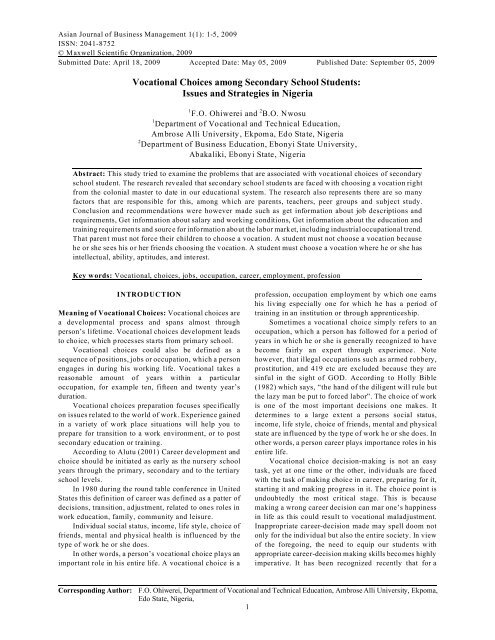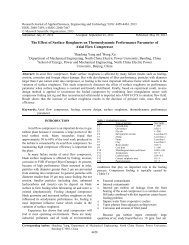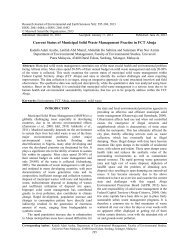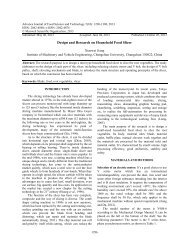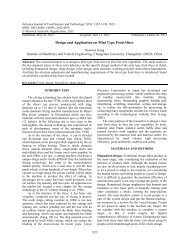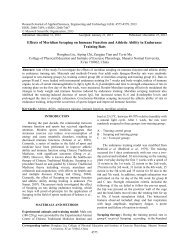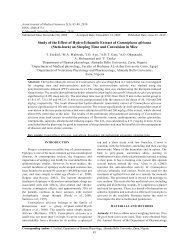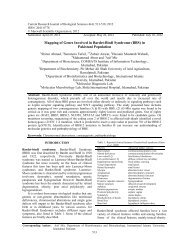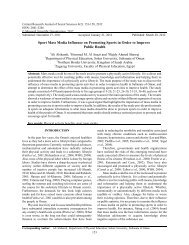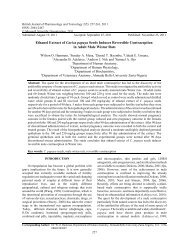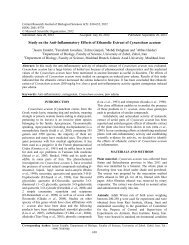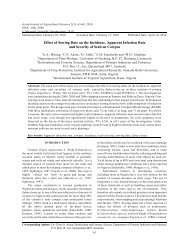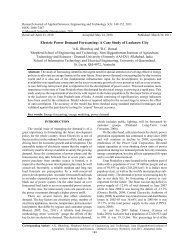Vocational Choices among Secondary School ... - Maxwell Science
Vocational Choices among Secondary School ... - Maxwell Science
Vocational Choices among Secondary School ... - Maxwell Science
Create successful ePaper yourself
Turn your PDF publications into a flip-book with our unique Google optimized e-Paper software.
Asian Journal of Business Management 1(1): 1-5, 2009<br />
ISSN: 2041-8752<br />
© <strong>Maxwell</strong> Scientific Organization, 2009<br />
Submitted Date: April 18, 2009 Accepted Date: May 05, 2009 Published Date: September 05, 2009<br />
<strong>Vocational</strong> <strong>Choices</strong> <strong>among</strong> <strong>Secondary</strong> <strong>School</strong> Students:<br />
Issues and Strategies in Nigeria<br />
1 F.O. Ohiwerei and 2 B.O. Nwosu<br />
1 Department of <strong>Vocational</strong> and Technical Education,<br />
Ambrose Alli University, Ekpoma, Edo State, Nigeria<br />
2 Department of Business Education, Ebonyi State University,<br />
Abakaliki, Ebonyi State, Nigeria<br />
Abstract: This study tried to examine the problems that are associated with vocational choices of secondary<br />
school student. The research revealed that secondary school students are faced with choosing a vocation right<br />
from the colonial master to date in our educational system. The research also represents there are so many<br />
factors that are responsible for this, <strong>among</strong> which are parents, teachers, peer groups and subject study.<br />
Conclusion and recommendations were however made such as get information about job descriptions and<br />
requirements, Get information about salary and working conditions, Get information about the education and<br />
training requirements and source for information about the labor market, including industrial occupational trend.<br />
That parent must not force their children to choose a vocation. A student must not choose a vocation because<br />
he or she sees his or her friends choosing the vocation. A student must choose a vocation where he or she has<br />
intellectual, ability, aptitudes, and interest.<br />
Key words: <strong>Vocational</strong>, choices, jobs, occupation, career, employment, profession<br />
INTRODUCTION<br />
Meaning of <strong>Vocational</strong> <strong>Choices</strong>: <strong>Vocational</strong> choices are<br />
a developmental process and spans almost through<br />
person’s lifetime. <strong>Vocational</strong> choices development leads<br />
to choice, which processes starts from primary school.<br />
<strong>Vocational</strong> choices could also be defined as a<br />
sequence of positions, jobs or occupation, which a person<br />
engages in during his working life. <strong>Vocational</strong> takes a<br />
reasonable amount of years within a particular<br />
occupation, for example ten, fifteen and twenty year’s<br />
duration.<br />
<strong>Vocational</strong> choices preparation focuses specifically<br />
on issues related to the world of work. Experience gained<br />
in a variety of work place situations will help you to<br />
prepare for transition to a work environment, or to post<br />
secondary education or training.<br />
According to Alutu (2001) Career development and<br />
choice should be initiated as early as the nursery school<br />
years through the primary, secondary and to the tertiary<br />
school levels.<br />
In 1980 during the round table conference in United<br />
States this definition of career was defined as a patter of<br />
decisions, transition, adjustment, related to ones roles in<br />
work education, family, community and leisure.<br />
Individual social status, income, life style, choice of<br />
friends, mental and physical health is influenced by the<br />
type of work he or she does.<br />
In other words, a person’s vocational choice plays an<br />
important role in his entire life. A vocational choice is a<br />
profession, occupation employment by which one earns<br />
his living especially one for which he has a period of<br />
training in an institution or through apprenticeship.<br />
Sometimes a vocational choice simply refers to an<br />
occupation, which a person has followed for a period of<br />
years in which he or she is generally recognized to have<br />
become fairly an expert through experience. Note<br />
however, that illegal occupations such as armed robbery,<br />
prostitution, and 419 etc are excluded because they are<br />
sinful in the sight of GOD. According to Holly Bible<br />
(1982) which says, “the hand of the diligent will rule but<br />
the lazy man be put to forced labor”. The choice of work<br />
is one of the most important decisions one makes. It<br />
determines to a large extent a persons social status,<br />
income, life style, choice of friends, mental and physical<br />
state are influenced by the type of work he or she does. In<br />
other words, a person career plays importance roles in his<br />
entire life.<br />
<strong>Vocational</strong> choice decision-making is not an easy<br />
task, yet at one time or the other, individuals are faced<br />
with the task of making choice in career, preparing for it,<br />
starting it and making progress in it. The choice point is<br />
undoubtedly the most critical stage. This is because<br />
making a wrong career decision can mar one’s happiness<br />
in life as this could result to vocational maladjustment.<br />
Inappropriate career-decision made may spell doom not<br />
only for the individual but also the entire society. In view<br />
of the foregoing, the need to equip our students with<br />
appropriate career-decision making skills becomes highly<br />
imperative. It has been recognized recently that for a<br />
Corresponding Author: F.O. Ohiwerei, Department of <strong>Vocational</strong> and Technical Education, Ambrose Alli University, Ekpoma,<br />
Edo State, Nigeria,<br />
1
person to make realistic decision his level of self-efficacy<br />
can indeed be very influential. It is one thing to<br />
demonstrate interest in a particular occupational field; it<br />
is another thing to have confidence in one’s ability to<br />
successfully undertake the task involved.<br />
Okon (2001) stated that vocational development of<br />
youths and the preparation and guidance they receive for<br />
the world of work should be of interest to all of us. We<br />
are convinced that a better job of career guidance in our<br />
schools will help to solve some of the problems of<br />
alienation and relevance which face the school today.<br />
According to Bandura (1986) it has to do with<br />
people’s judgment of their capabilities to organize and<br />
execute courses of action required to attain designed type<br />
of performances.<br />
According to Smith (2007) the questions below can<br />
help connect what you are learning in school to the skills<br />
and knowledge needed in the work place and society in<br />
general. Your answers to these questions will be unique<br />
to you and will provide personal insight as you prepare to<br />
go to university, or to further training or to the world of<br />
world.<br />
How does the 30 h of work experience for grade 12<br />
graduation and the additional work experience hours of<br />
career programs, relate to your career, educational and<br />
personal goals.<br />
• What do you need to know about job seeking and<br />
job-keeping?<br />
• How can you demonstrate, evaluate and document<br />
your life and work skills?<br />
• What are the variety of management and<br />
organizational structures that exist in the work place<br />
of your choice?<br />
• How do you create a personal financial plan to<br />
support achievement of your educational goals?<br />
DISCUSSION<br />
Factors Affecting <strong>Vocational</strong> Decision Making: These<br />
factors are;<br />
• Individual differences<br />
• External Factors<br />
Individual Differences: These factors are resident in the<br />
individual. They are those personal characteristics of the<br />
individual that determine his vocational choice. They<br />
include; intellectual ability, aptitudes, interest, his/her<br />
value system, low motivation, self-esteem, sex, attitude<br />
towards various occupations, his personal, mental and<br />
emotional disposition.<br />
External Factors:<br />
Teachers’ Influence/Problem: A teacher is the central<br />
point of learning in a classroom situation this is because<br />
he decides whether the subject will be of interest to the<br />
students or not. A student may like a particular subject<br />
Asian J. Bus. Manage., 1(1): 1-5, 2009<br />
2<br />
very well but because of the poor teaching method of the<br />
teacher such a student may lose interest for such subject.<br />
According to ITAA (1998) secondary school<br />
educators often have a large influence on students’<br />
vocational choices.<br />
A student may like chemistry but the man who stands<br />
in front of him is a little eccentric. He tends to trail off the<br />
subject matter, which the students are meant to be<br />
learning and just go off on a tangent. This makes it hard<br />
to keep up with him because he really does not what is<br />
relevant to the class and what is not.<br />
In addition, a teacher may be a soft talker so one has<br />
to strain his or her ear to hear him. This may be difficult<br />
during the first couple of weeks, but once the students<br />
discover that if they talk in his class it become difficult to<br />
hear him, they will stop talking in his class, lack of<br />
adequate teaching methods by the teacher may lead to<br />
failure.<br />
Parental Pressure or Influence: Parents generally would<br />
wish their children to achieve where they failed. To<br />
enable them achieve this, they ensure that they send their<br />
children to high-class school, which exposes the children<br />
to good vocational choices.<br />
Economic and Political Condition of the Country: Due<br />
to economic depression experienced in Nigeria today,<br />
most individuals engaged in multiple jobs. Some<br />
individuals own part time private business as well as<br />
government job. Again, due to our economy that changed<br />
from agriculture to oil, most graduates seek for<br />
employment in oil companies to earn better pay. This in<br />
turn swells the number of students wishing to study<br />
Petroleum Engineering.<br />
Peer Groups’ Pressure or Influence: According to<br />
Obanewa (1994) Peer groups are usually made up of<br />
playmates, friends or people within the same age bracket.<br />
They serve as confidants to their members. In most cases<br />
they belong to same social clubs where they share the<br />
same values and ideals. While, Topping (1989) says many<br />
educators considered peer groups to be an effective and<br />
powerful instructional strategy that can be used to develop<br />
academic as well as social skills in peer group.<br />
Piaget (2002) peer tutoring when used as a teaching<br />
technique can help children to be more active in the<br />
learning process. Through this process, children can easily<br />
influence their peers.<br />
Adequate <strong>Vocational</strong> Choice Information: According<br />
to the Pitman Dictionary of English and Shorthand (1994)<br />
information is defined as intelligence given, instruction<br />
informing or being informed, told, news or knowledge<br />
given. You cannot apply for a course unless you have<br />
adequate information about it.<br />
Subject Studies/Combination: Since subject studies or<br />
subject combination have direct influence or bearing on
ones future academic vocation, it should not be left alone<br />
for students. It is necessary to assist the students in<br />
guarding the students to choosing the right subjects for<br />
future vocation. Students who are left unguarded are<br />
prone to choose subjects, which are not directly related to<br />
their future career. We are therefore of the opinion that<br />
students should be helped right from junior secondary<br />
school.<br />
Other factors are;<br />
• Religious affiliation<br />
• Sex stereotype of careers<br />
• Job prospect<br />
• Finance<br />
• Prestige attached to the job by society or society’s<br />
rating of vocation<br />
• Educational level of individual e.g. school certificate,<br />
first degree, masters degree or Ph.D.<br />
21 st Century <strong>Vocational</strong> Prospect: According to the<br />
Ministry of Education (2005) in today’s world of rapid<br />
technological and economic change, uncertainty about<br />
skill requirements in the workplace, and abundant<br />
learning and vocational paths, vocational planning is more<br />
difficult than ever. The following messages are worth<br />
keeping in mind as you think about transition and<br />
vocational planning.<br />
Change is Constant: Change has become a constant<br />
force both at work and in life outside of work. However,<br />
change often brings opportunities, flexibility, versatility<br />
and adaptability during transitional times, which can be<br />
the keys to vocational-building success.<br />
Focus on the Journey: Life is a journey that is made up<br />
of experiences, and destinations are merely stopping<br />
points along the way. <strong>Vocational</strong> building requires us to<br />
focus on our goals, while also paying attention to<br />
everything that occurs as we travel towards those goals.<br />
Learning is Continuous: Learning, in all contexts, is a<br />
continuous, lifelong process. Learning, work and skills<br />
development are intertwined as we engage in our<br />
vocational-building experiences.<br />
Team up with others: We are surrounded by people who<br />
can assist us in making vocational decisions and in other<br />
ways as we travel the road of life. Family, friends,<br />
neighbours, co-workers, and teachers are all potential<br />
supporters and mentors. Build networks, of supporters and<br />
be part of the networks of others.<br />
Follow your Heart: We do our best when we work at<br />
what we love or have a passion for. The pursuit of dreams<br />
motivates and directs us, and helps clarify what is<br />
important to us. <strong>Vocational</strong> building makes us consider<br />
what we feel in our hearts.<br />
Asian J. Bus. Manage., 1(1): 1-5, 2009<br />
3<br />
Planning your Vocation: According to the University of<br />
Dublin (2005) Soda is how to discover your mission in<br />
life and it is a four stages vocational planning process to<br />
assist you through college and life.<br />
• S = Self-Knowing Yourself<br />
Assess your interests, strengths, values and abilities,<br />
knowing yourself are the key to happy vocational sound<br />
decisions.<br />
• O = Opportunities - Knowing your Opportunities<br />
Assess your options from different angles; options that<br />
lead from your degree, that suit you, and that the labour<br />
market presents.<br />
• D = Decision – Making Decision<br />
Informed by discussions with friends, family,<br />
professional, graduates, academics, and a vocational<br />
adviser you reach your decisions on the best goal for you,<br />
be it work, study or timeout.<br />
• A = Action – Taking Action<br />
The time comes to make your goal a reality. Complete the<br />
necessary application forms and curriculum vitae and get<br />
to interview stage to get the job or study your aim for.<br />
Subjects Taught In <strong>Secondary</strong> <strong>School</strong>s: In Nigeria, we<br />
operate the 6-3-3-4 educational systems. The 6 years is<br />
for primary school, the junior secondary school last for<br />
three years and the senior secondary school also last for<br />
three years while the four years is for the tertiary<br />
institutions.<br />
The Core Subjects: They are the compulsory subjects,<br />
which must be offered and passed in junior class and<br />
during the junior secondary school examination, all<br />
students irrespective of the student’s attitude, interest or<br />
future ambition. These compulsory subjects are English,<br />
Mathematics, Social studies and integrated science.<br />
Elective Subjects: These are subject to be taken by all<br />
students as a matter of policy out of which three must be<br />
passed before such a student can proceed to junior<br />
secondary school one. The subjects are Physical and<br />
Health Education, CRS/IRK, Nigeria languages (Hausa),<br />
Yoruba, Ibo and Edo, Agricultural <strong>Science</strong>, Music, Arabic<br />
or French.<br />
Pre-<strong>Vocational</strong> Subjects: These are required subjects,<br />
which the students must offer at the junior secondary<br />
before proceeding to the senior secondary school, the<br />
students are expected to pass at least two i.e. Introductory<br />
Technology, Business Studies, Home Economics, Food<br />
Nutrition, Fine Arts or Local Craft. All students are<br />
required to offer all these subjects and must pass at least<br />
nine or seven including core subjects, which will<br />
determine transition to senior secondary school one and<br />
appropriate class to be placed. It is the core courses that<br />
determine where they are to be placed.<br />
Since subjects’ combinations have direct influence or<br />
bearing on ones future academic vocational choice,<br />
therefore, it should not be left alone for the student. It is
necessary to assist the students in choosing the right<br />
subjects for future vocational choice. Students who are<br />
left unguarded are prone to choosing subjects, which are<br />
not directly related to their future vocational choices<br />
(Table 1).<br />
Literature suggests that a significant number of<br />
secondary school students take <strong>Vocational</strong> choice during<br />
their secondary school years. Graves et al. (1993) Nelson<br />
& Deines (1995) and that it is often tool late to change a<br />
person’s vocational choice by the time he or she finishes<br />
secondary school. Abtan (1993) stated a Gallup poll<br />
indicated that secondary school teachers are second only<br />
to parents as the most important influence on secondary<br />
school students’ vocational choice decisions. Dodson &<br />
Prince (1991) secondary school students view largely part<br />
by the advice and counsel of their secondary school<br />
teachers and counselors.<br />
The Apprenticeship System: According to Akinseinde<br />
(1996) the apprenticeship system was a means of<br />
providing trade training for younger citizens. The system<br />
was used during the medieval times to transmit cultural<br />
heritage from one generation to the other. It was<br />
considered the natural method whereby children learn the<br />
occupations of their parents. There were the voluntary<br />
apprentices who entered into the agreement of<br />
apprenticeship because of their desire to learn trades. The<br />
apprentice worker lived with the master and served him<br />
faithfully keeps his secrets and commands, and bound out<br />
by his parent to the master for up to seven years. The old<br />
time apprenticeship was broken down by the development<br />
of power machinery and greater demand for cheap labour.<br />
Modern apprenticeship trades include barbing,<br />
carpentering, painting, printing, seamstress, tailoring<br />
weaving and hairdressing, mechanics, electrician, trading<br />
in motor spare parts and electricity parts etc. At the onset,<br />
the apprentice enters into agreement of apprenticeship,<br />
which is an often three to six years agreement. The master<br />
craftsmen shall agree to teach and instruct the apprentice<br />
in the art and mystery of the trade. Highly skilled<br />
occupations such as masonry, plumbing, air-conditioning,<br />
construction crafts and the printing industry often utilize<br />
the apprenticeship system for effective learning. The role<br />
of the apprenticeship system was later taken over by the<br />
public vocational schools. That is the reason which today<br />
you find courses like melta work, glass blowing, auto<br />
mechanics, building, wood work, electric and electronics,<br />
block laying, concreting, catering and hotel management<br />
are offered in pre-vocational schools.<br />
CONCLUSION<br />
In conclusion, after self-assessment, the next step in<br />
the vocational choices planning process is to locate<br />
information about vocational choice interest, because<br />
vocational are rapidly changing, it is important to locate<br />
current services of information such as products and<br />
Asian J. Bus. Manage., 1(1): 1-5, 2009<br />
4<br />
Table 1: Subjects for Traditional <strong>Vocational</strong> Opportunities<br />
Classes Subjects Combination Possible Future <strong>Vocational</strong><br />
<strong>Science</strong> English Language, Mathematics, Teacher, Lecturer, Medical<br />
Physics, Chemistry, Biology, Doctor, Pharmacist, Surveyor,<br />
Geography, C.R.K/IRK, Economics, Mechanical Engineering,<br />
Any Nigeria Language, Further Electrical/Electronics<br />
Mathematics, Food Nutrition, Engineering, Agriculturist,<br />
Agric <strong>Science</strong>. Home Economist, Fashion<br />
Designer, Guidance and<br />
Counselor etc.<br />
Social English Language, Mathematics, Bursar, Accountant, Banker,<br />
<strong>Science</strong>s Accounts, Economics, Commerce, Auditor, Computer operator,<br />
Biology, CRK/IRK Geography, Teacher/Lecturer,<br />
Literature in English, French, Any Administrator, Confidential<br />
Nigeria Language, Food Nutrition Secretary, Typist, Bilingual<br />
and Agric <strong>Science</strong> Secretary, Guidance and<br />
Counselor etc.<br />
Arts English Language, English Literature, Lawyer, News Caster,<br />
Mathematics, Accounts, Commerce, Teacher/Lecturer, Public<br />
Biology, Geography, Economics, Administrator, Liberian,<br />
History, CRK/IRK French, Any Journalist, Guidance and<br />
Nigeria Language, Food and Nutrition, Counselor etc.<br />
Agric <strong>Science</strong>, Fine Arts, Governm ent.<br />
Source: Classroom Lecture Note: Alutu (2004)<br />
services, including publications, videos, and internet<br />
resources, friends, family, teachers, co-workers etc. We<br />
must stress here that there is need for both parents and<br />
students to take vocational planning very seriously as this<br />
will determine whatever the child will become in future.<br />
RECOMMENDATIONS<br />
• Get information about job descriptions and<br />
requirements.<br />
• Get information about the salary and working<br />
conditions.<br />
• Get information about the education and training<br />
requirements.<br />
• Source for information about the labour market,<br />
including industrial occupational trend.<br />
• That parents must not force their children to<br />
choose a vocation.<br />
• A student must not choose a vocation because he<br />
or she sees his or her friends choosing the<br />
vocation.<br />
• A student must choose a vocation where he or she<br />
has intellectual, ability, aptitudes, and interest.<br />
• Experts to make appropriate vocational choices<br />
e.g. a guidance counselor must guide that student.<br />
• That if you are not opportune to further your<br />
education, you must have to learn a trade.<br />
• That the parents or teachers and even the child<br />
should detect his or her line of vocation from<br />
primary school by knowing his or her subjects of<br />
interest.<br />
• Finally, there is no vocation that is not important<br />
but it depends on you as an individual to work hard<br />
and be able to put your resources together as<br />
evidenced in Holy Bible (1982) which says “what<br />
so ever they hand findeth to do, do it with thy<br />
might, for there is no work, nor device, nor<br />
knowledge, nor knowledge, nor wisdom in the<br />
grave whither thou goest”.
REFERENCES<br />
Abtan, P. 1993. The gender gap. Computing . Canada: pp:<br />
9.<br />
Akinseinde, S.I., 1996. Administration of vocational<br />
education programmes.<br />
Alutu, A.N.G., 2004. <strong>Vocational</strong> guidance. Masters<br />
Degree classroom Lecturer notes. University of<br />
Benin. Unpublished. University of Benin.<br />
Bandura, A., 1986. Social foundation of thought and<br />
action. A social cognitive theory. Englewood<br />
Cliffs. NJ: Prentice Hall<br />
Dodson, N.J. and J.C. Prince, 1991. Who is tomorrow’s<br />
CPA? The Ohio CPA J., pp. 9-14.<br />
Graves, O.F., I.T. Nelson and D. Deines, 1993.<br />
Accounting student characteristics: Results of the<br />
1992 federation of schools of accountancy (FSA)<br />
survey. J. Account. Edu., 11: 211-225.<br />
Information Technology Association of America (ITAA)<br />
1998. Changing the image of information<br />
technology professions. Alexandria, Virginia:<br />
January.<br />
Ministry of Education, 2005. Prospects 2003. The highfive<br />
messages of career planning. Queen’s Printer<br />
for Ontario.<br />
Asian J. Bus. Manage., 1(1): 1-5, 2009<br />
5<br />
Nelson, I.T. and D.S., 1995. Accounting student<br />
characteristics results of the 1993 and 1994<br />
Federation of schools of accountancy (FSA)<br />
Survey. J. Account. Edu., 13(4): 393-411.<br />
Obanewa, O., 1994. An introduction to the teaching<br />
profession in Nigeria, Ekpoma: Institute of<br />
Education, A.A.U.<br />
Okon, S.E., 2001. Education and work: Career planning<br />
and decision making. Zaria: Ahmadu Bello<br />
University Press.<br />
Piaget, J., 2002. An overview of his theories can be found<br />
in the course documents. Retrieved on 25 th Jul,<br />
2005 from http//cityon line:ccny.cuny.edu/<br />
course/EDUC,20500/.<br />
Pitman Dictionary of English and Shorthand, 1994.<br />
London: Sir Isaac Pitman and Sons Ltd., pp: I-18.<br />
New Era Edition.<br />
The Holly Bible, 1982. New king James version.<br />
Ecclesiastes 9 v 10 Thomas Nelson, Inc., pp: 453.<br />
Topping, K.J., 1989. Peer tutoring and paired reading.<br />
Combining two powerful techniques. The reading<br />
teacher, 15: 120-136.<br />
University of Dublin, 2005. Careers Advisory Services.<br />
Take a step in the right direction. Accessibility A-<br />
Z Search TCD. Ontario: Queens Printer.


